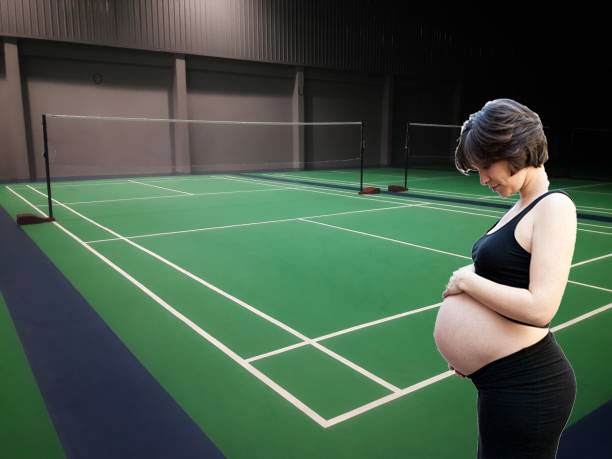We often see pregnant women are obese with big stomachs. Most of them have difficulties moving and walk around for a long time.
If pregnant women go to play badminton, they may face great danger. Playing badminton requires rapid movements such as jumping, running, hand stretching, bending over, etc. While pregnant women have a baby in their stomach, it is not suitable to conduct such strenuous exercise.

Can I Play Badminton in Early Pregnancy?
Some people think pregnant women can play badminton in their early pregnancy. Is it really the case? It is not true, and they are not suitable for playing badminton even in the early stage of pregnancy. Why?
Pregnant women need to take extra precautions in the first 3 months of pregnancy. Since the fetus is still not stable, it is best not to exercise vigorously at this stage. From 12 weeks to 28 weeks during pregnancy, pregnant women can carry out some appropriate exercises.
Pregnant women are not suitable to do any exercise after 28 weeks of pregnancy. This is because the fetus has grown very large, and exercise may cause allergic contractions. This may lead to some issues, such as premature birth of the baby.
For pregnant women, during the 12 weeks to 28 weeks of pregnancy period, even they can do exercises, they still need to be careful in picking the types of exercises they can do.
You may also want to read this post on how bad habits can endanger your body playing badminton.
What Sports Can You Play While Pregnant?
It is best to do sports such as swimming, walking, maternity gymnastics, and simple yoga. All these are good choices for exercise.
I would recommend you to take a walk instead of playing badminton. The sum of the daily walking time is better to be in between 1 to 2 hours. When sleeping, choose the left side to sleep, which is good for fetal blood circulation.
What Activities Should Be Avoided During Pregnancy?
It is recommended that you do a checkup during pregnancy with your doctor. Be sure to avoid strong abdominal exercises and having physical contact with others. Try not to hop or sprint. Avoid fast-moving sports, such as playing badminton and tennis.
Playing badminton is a sport that involves lifting, running, jumping, etc., which can endanger the growth of the baby.
Activities like horse riding or diving are also not suitable for pregnant women. Especially diving can put pregnant women in an anoxic state and cause fetal malformation.
It is best for pregnant women not to play this intense sport. If you want to do exercises, you can go walking or jogging.
You can also learn about the advantages and disadvantages of playing badminton.
Fitness Level Determine Your Exercise Routine
Now you are pregnant. You will want to pay attention to your body while exercising. Your current fitness level will determine your upcoming routine of exercise. Pregnancy has some guidelines that should be followed when it comes to exercise.
If you weren’t active before you got pregnant, you would want to start slow and work your way up. If you exercise regularly, then you can continue but within reason. You should always check with your doctor before beginning any exercise program while you are pregnant.
If you are not pregnant but plan on getting pregnant, I suggest starting an exercise routine as soon as possible. This will make it easier to exercise during your pregnancy. This doesn’t mean women who have never exercised shouldn’t begin while pregnant.
Your fitness goals change when you become pregnant. Suppose your old exercise style was training for a marathon that’s about to change. You’re preparing your body to deliver a baby not fit into a certain pair of jeans. You never want to put yourself or the baby under heavy strain. Start with short intervals of exercise and gradually increase intensity.
What pregnant women need to avoid:
- Do not carry out any activity in an environment that is too hot or too cold. If the pregnant woman’s temperature is too high or too low, it will harm the development of the fetus.
- Avoid excessive jumping, bouncing, or vigorous movements to prevent you from falling and damage the fetus.
- Avoid training in a supine position if you have been pregnant for over four months because the weight of the fetus can affect blood circulation.
- Physiological changes during pregnancy can lead to ligament relaxation. You need to take extra care to avoid excessive pulling of muscles and joints when playing badminton. It is not suitable for pregnant women to play the game because they can easily pull the muscles and joints.
In daily life, expectant mothers also need to try to avoid some manual labor. First of all, be careful not to carry any heavy object. Also, you cannot squat, stand, bend your body, and doing housework for a long time.
These excessive activities can oppress the abdomen or cause overwork. This can cause the baby discomfort, causing miscarriage or premature birth.
During pregnancy, expectant mothers can carry out some appropriate exercises. This will not only regulate the function of the nervous system but also promote blood circulation. This will help the growth and development of the baby. But expectant mothers must pay attention by not exercise for a long time.
The Best Time For Expectant Mothers To Exercise
Four months to seven months after pregnancy is the best exercise period for pregnant women. Exercise during this period can help pregnant women improve blood circulation and enhance the training of pregnant women’s muscle tissue, which is beneficial for future childbirth.
The air quality in rural areas is better. So pregnant women can choose to exercise in the morning and evening. If you are pregnant and live in the city, when you do your daily exercise, it is best to avoid the time between 4 pm and 7 pm, because the air pollution in this period is the most serious in a day.
The exercise needs to be gradually progressing. You need to carry out the whole process when doing the exercise, like the warm-up, stretching, and cool down after exercise.
Precautions For Pregnant Women When Doing Exercise
Do warm-up exercises
After pregnancy, the movement of the pregnant woman is greatly reduced, and the muscles and joints are relatively relaxed. A simple warm-up is always best. The exercise should be a low impact, like walking for 5-10 minutes at a nice steady pace. You can gradually increase your speed as well through the warm-up.
If you skip the warm-up exercise, the muscles can easily get strained or cramped. This will cause pregnant women to feel tired.
Wearing an appropriate sport suit
Pregnant women should wear comfortable sports suits to do the exercise. It is best to choose elastic sportswear.
Sportswear can absorb sweat and also help the stretching of pregnant women. Your stretch period should include all areas of the body. Hold a stretch for at least 15 seconds. Don’t stretch to the point of pain, and don’t allow yourself to bounce while stretching.
Before the exercise, remove all the items in the pockets and the items worn on the body. During exercise, the ambient temperature is preferably around 26 – 27 ° C. Try to avoid excessive temperature, which can cause a stroke in pregnant women.
Manage the range of exercise
Pregnant women should avoid intense movements when doing exercise, such as jumping, sitting up, etc. These actions are not good for the fetus. When exercise, you should control the heart rate below 140 per minute, and the exercise time should not exceed 20 minutes. Pregnancy exercise is mainly to train muscles, not to burn fat.
Drink enough water
Even though you only do mild exercises, you must replenish water before, during, and after exercise.
Drinking water can prevent pregnant women from dehydration during exercise and control the rise of body temperature to ensure the stability of the fetus. Pregnant women can drink the right amount of juice, vitamins but do not drink soft drinks or sports drinks.
Benefits of Pregnancy Exercise
Moderate exercise is good for the mother’s health.
Conducive to enhance physical fitness, exercise can promote blood circulation and metabolism, slow down the symptoms of waist and leg pain, can prevent and reduce limb edema in pregnant women.
It helps natural childbirth. Exercise enhances pregnant women’s body structure and exercises the muscle tissue of pregnant women, especially the abdominal muscles. Full exercise of the abdominal muscles can reduce fetal dystocia. The exercise of the whole body muscle tissue of pregnant women also contributes to natural childbirth.
Relieve fatigue during pregnancy. Pregnant women often have insomnia, nervousness, and even constipation during pregnancy. Exercise can help pregnant women relax and relieve fatigue.
Quickly adapt to the pregnancy response. Moderate exercise can effectively regulate the nervous system of pregnant women, can help pregnant women quickly adapt to a series of pregnancy reactions, enhance the appetite, and thus promote the absorption of nutrients.
Moderate Exercise is Good for Baby Development
They can help to promote fetal brain development.
Pregnant women exercise increases the blood oxygen content of the mother, promotes the release of beneficial substances such as enkephalin from the mother’s brain, and transmits it to the fetus, which is beneficial to the growth of the fetus. In addition, exercise can shake the amniotic fluid, promote the circulation of amniotic fluid, stimulate the whole body of the fetus, and facilitate brain development.
They can help to promote fetal body development.
While pregnant women exercise, it is equivalent to the fetus exercising, which can effectively reduce the probability of fetal obesity. Exercise can promote the development of the fetal respiratory system, sensory system, and various organs and promote healthy growth.
